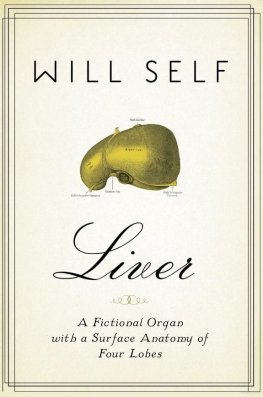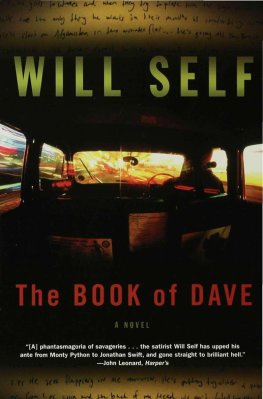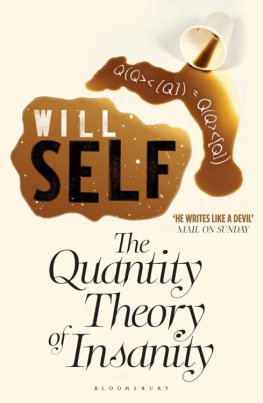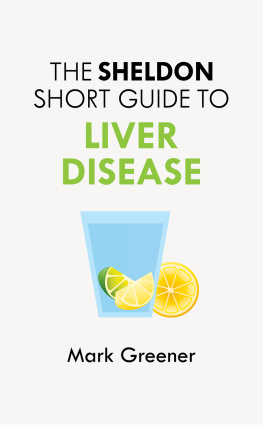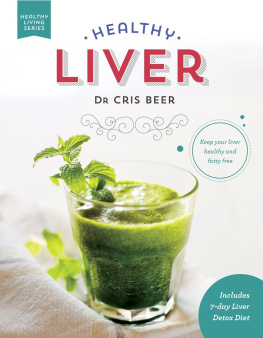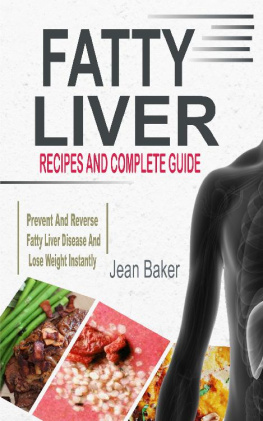Will Self
Liver: A Fictional Organ With a Surface Anatomy of Four Lobes
For Marc, Georgia and family
Who sees with equal eye, as God of all,
A hero perish, or a sparrow fall,
Atoms or systems into ruin hurled,
And now a bubble burst, and now a world.
Alexander Pope, Essay on Man, I, 87-90
Val Carmichael credited Pete Stenning who was always called the Martian with getting him off the gin and on to the vodka.
Clever cunt, the Martian, Val said to the assembled members, who were grouped at the bar of the Plantation Club in their allotted positions. Left to right: Val on a stool by the till, Scotty Henderson (the Dog) on the one next to him, Dan Gillespie (the Poof ) on the one after that a tricky position, since, if the Poof tipped back, which he often did, he would be struck by the door if someone happened to come in.
In the second row were Bernie Jobs (the Cunt) and Neil Bolton (the Extra). While the other nicknames were mostly referential, as in, Poof bin in?, Bolton was called the Extra to his rubbery-handsome face. He was a leading British character actor, and Val, who had known Bolton the longest, had issued one of his draconian decrees, to the effect that, having prostituted himself on the West End stage and in a number of hugely successful Hollywood filmed musicals the Extra was no longer entitled to any more familiar form of address. Bolton took this in good part.
At the back, completing this scrum of drinkers, was Phillip McCluskey (His Nibs). McCluskey was the diarist on a mid-market tabloid, and celebrated on Fleet Street for the McCluskey Manoeuvre, which consisted of his putting a drunken hand up a young womans skirt, then falling unconscious with it clamped, vice-like, around her knickers, the waistband a yanked communication cord in his sweaty hand.
The success of the Manoeuvre rested, in part, on McCluskeys saintly demeanour: until he made his move he looked and behaved like a choirboy who had stayed on in the stalls for five decades, ageing but never growing up. Besides, at the beginning of McCluskeys long career such behaviour was pretty standard, while latterly he was protected by his proprietor, who, as well as appreciating the reliably incendiary gossip the diarist poked through the letter-boxes of Middle England, was also an enthusiastic molester himself.
His Nibs wasnt in the Plantation that often; long lunches at Langans or Bertorelli were essential to his mtier, and this was an afternoon club. His frequent absences meant that the three other solidly dependable members were usually able to join in free intercourse with the barflies, even though their stations were some way off.
The Martian himself, and Margery De Freitas (Her Ladyship), sat at a small, round, melamine-topped table, set against the bit of wall that separated a niche where an upright piano lurked from the sloping embrasure that terminated in the bleary eye of a sash window. Meanwhile, on a stool midway between the piano niche and the main door, perched the Honourable Sarah Mainwaring, who, having more rightful claim to a title than Her Ladyship, was instead known as the Typist, a nod to the fact not obvious from her county-set manner, her twin set and her solidly set hair that she was the senior commissioning editor for an august and famously high-brow publishing house.
See, Val went on, the Martian says that all the juniper berries in the gin make it an impure spirit. Toxins build up. Cunts. Too many vitamins. Gotta stop it. But vodkas completely fucking pure: just grain nothing else. Its a well-known fact Val cupped his elbow in his hand and pointed out indecipherable smoke slogans with the tip of his cigarette that vodka drinkers and Im talking absolutely fucking pure stuff can live for bloody ever. Aint that so, Marshy? He turned on his stool to acknowledge his life coach, and the Martian raised his glass of vodka and orange in salute.
The other members were sceptical and expressed it in their several ways: the Dog (Scotch) snuffled; the Poof (Campari and soda) tittered; the Cunt (Scotch also) sniggered; the Extra (lager) openly guffawed. Neither the Typist (gin and bitter lemon) nor Her Ladyship (gin and tonic) gave voice, although both evinced dissent, the former puckering her long top lip so that her thick foundation cracked, the latter pulling at one of her hideous novelty earrings, which were in the shape of bunches of red grapes.
It is so, the Martian pronounced. His voice was at once low and nasal, so that each carefully enunciated syllable vibrated. Thats why I drink vodka myself, although with orange juice as a mixer, rather than tonic, on account of certain. health issues. Then he took a swig of his drink, replaced it on the table and ran his stubby fingers through his greenish hair.
It was this greenish hair that had given the Martian his moniker the hair, and a slightly other-worldly manner that, although difficult to pin down, was none the less there. The Martian lived by himself in a large and mouldering house on Melrose Avenue in Kilburn. The house was damper in than out; sodden rendering flopped from the faade, and on one occasion a lump narrowly missed the postwoman.
The Martian was a printer by trade. The others never asked him about his work shop talk was derided at the Plantation but it was generally assumed, from the closeness he enjoyed with the Cunt who managed Sadus, the sadomasochistic porn shop on Old Compton Street that the Martian spent his mornings and evenings checking the registration of tormented flesh.
Course, tonic water, the Martian continued, has quinine in it even that Schweppes piss Val flogs and quinines what they used to take out to the colonies for malaria. Used to be more valuable than fucking gold by far. Lowers the body temperature, see, stops the malarial parasites getting into yer red blood cells, then fetching up in yer bloody liver.
This was a long speech for the Martian, whose remarks were usually one-liners, and the other members remained silent, stunned by his verbosity.
It was left to the final occupant of the Plantation to essay a reply. Hilary Edmonds (the Boy) stood behind the tiny semicircular bar no more than an apostrophe of wood and cloth, denoting the absence of some far more solid thing facing the front row of the scrum and rubbing dirt into a dirty glass with a dirty cloth. B-But, P-Pete, he charmingly stuttered, you aint gonna get malaria in Soho, are you?
Perhaps not, although the Soho the miasmal Plantation Club floated above was certainly a swamp: pools of urine and spilt drink reflected the low grey skies, while for its slithering denizens the solid four-storey terraces had all the insubstantiality of reed beds.
Not that any of this was immediately apprehensible from the confines of the Plantation, which was a world entire, accessed via two flights of stairs from Blore Court, a grimy alley that linked the filmic commerce of Wardour Street to the sweetly rotten fruit and veg market in Berwick Street.
Blore Court was a time portal, a fossilized trace of a thoroughfare around which the living city had continued to grow. If a passer-by noticed this four-foot-wide crevice in the brick bluffs and ventured inside, he would be transported back to the era when a huge rookery of slums roosted here, its smoke-blackened hovels, festooned with smutty laundry, over-toppling a maze of alleyways that, as thin and dark as ruptured veins, wormed their way crazily through the face of the drunken city.
The right-hand side of Blore Court was a single sweep of brickwork sixty feet high, and unrelieved by window or door. Behind this were the offices of a film distributor, where men in shirtsleeves shouted down phones at space salesmen, and runners panted as they waited for their tin discuses.

